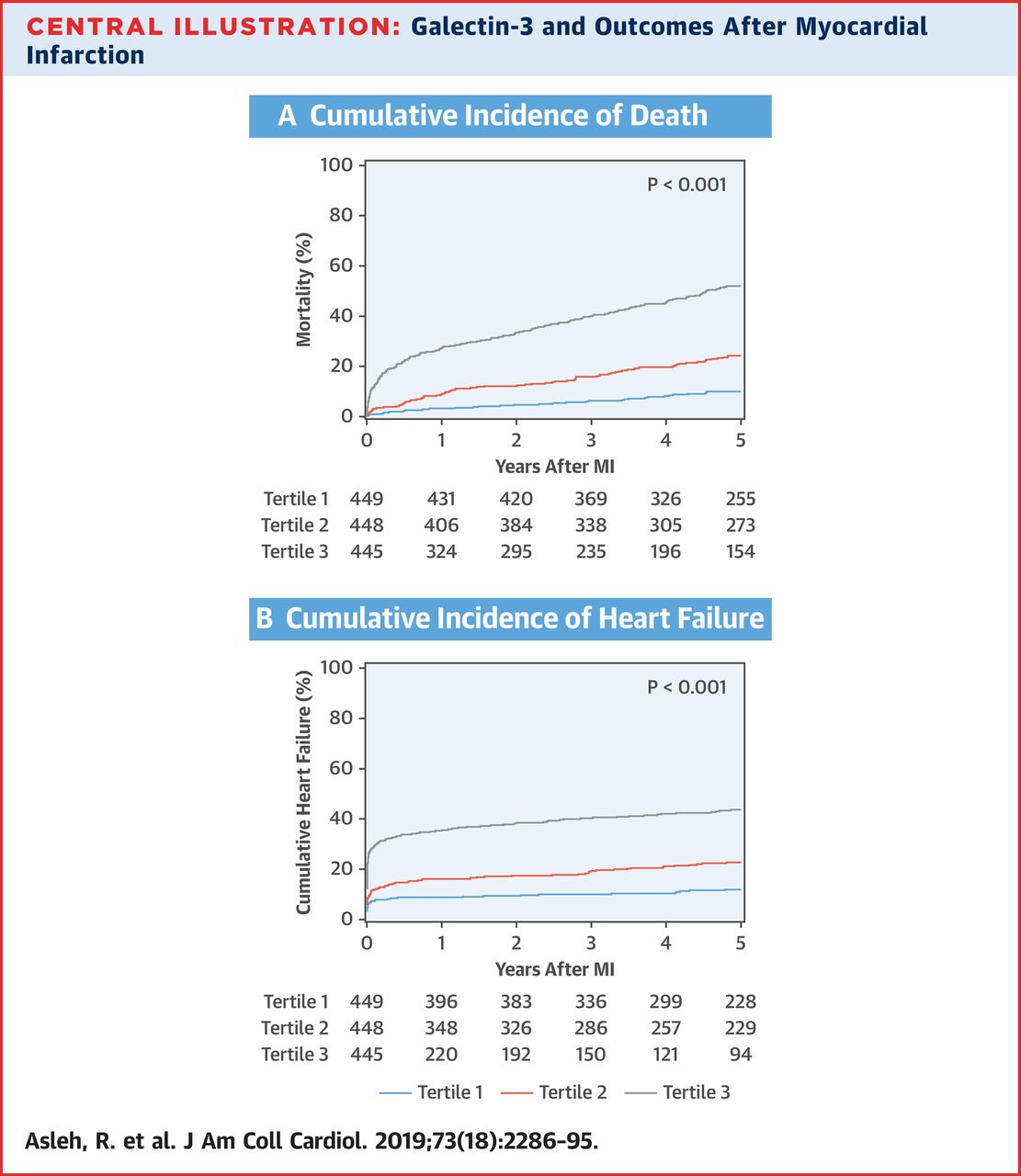
Pre-reading
Galectin-3对心肌梗死后死亡与心衰的预测价值
CBSMD
目前有三种可有效预测心肌梗死的因子,其一是心肌肌钙蛋白(Troponin,cTn),尤其是MI慢性期的肌钙蛋白水平;另外两种反映心肌梗死后心肌纤维化的相关生物标记物,一是生长刺激表达基因2蛋白(growth STimulation expressed gene 2 , sST2),ST2是心肌细胞受到生物机械应力后产生的一种蛋白 ,现有证据显示人体ST2有两种存在形式:可溶性ST2(soluble ST2, sST2)和跨膜形式ST2(ST2L),对心梗后期预测死亡及心衰有重要意义;二是半乳糖凝集素-3水平(Galectin-3 level),反映心肌纤维化和心肌重构情况,现阶段研究的进展尚处于争议阶段,争议的主要焦点之一集中在心肌梗死前后危险分层的准确度;另一争议焦点集中在与其他生物标记物比如与SST2的比较上。
“2016 ESC Guidelines for the diagnosis and treatment of acute and chronic heart failure”有关心衰生物标记物的相关描述还停留在“Although there is extensive research on biomarkers in HF (e.g. ST2, galectin 3, copeptin, adrenomedullin), there is no definite evidence to recommend them for clinical practice.”。
“2017 ACC/AHA/HFSA Focused Update of the 2013 ACCF/AHA Guideline for the Management of Heart Failure: A Report of the American College of Cardiology/American Heart Association Task Force on Clinical Practice Guidelines and the Heart Failure Society of America”肯定了sST2和galectin-3 对心衰的预测价值,原文为“Biomarkers of myocardial fibrosis, soluble ST2 receptor, andgalectin-3 are predictive of hospitalization and death and may provide incremental prognostic value over natriuretic peptide levels in patients with HF”,并建议临床结合多项生物标记物测定结果提高整体预测水平。
JACC上最新发布的“Galectin-3 Levels and Outcomes After Myocardial Infarction A Population-Based Study”探讨了在2002-2012年间心梗患者发作期Galectin-3水平,以及不同Galectin-3水平与心梗后死亡事件和心衰间的相关性,明确了Galectin-3三分变量作为心梗后预测死亡和心衰的危险预测价值。结合1342名心梗患者群基线数据:平均年龄67岁,男性占比71%, Non-STEMI患者占比78% 。5年生存率64%, 5年心衰患病率27%,Galectin-3水平高的患者群整体健康状况更糟。临床上可对Galectin-3三分变量处于高水平的心梗患者在最佳治疗时间窗内给予更激进的治疗方案。

Galectin-3 Levels and Outcomes After Myocardial Infarction: A Population...
J Am Coll Cardiol. | May 08,2019
2016 ESC Guidelines for the diagnosis and treatment of acute and chronic he...
Eur Heart J. | Feb 28,2018
2012 ACCF/AHA/ACP/AATS/PCNA/SCAI/STS Guideline for the ...
J Am Coll Cardiol. | Nov 21,2018
2017 ACC/AHA/HFSA Focused Update of the 2013 ACCF/AHA Guidel...
J Am Coll Cardiol. | Mar 15,2018